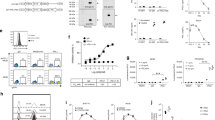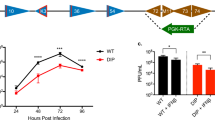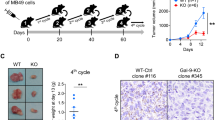Abstract
The immune system confers protection against a variety of pathogens and contributes to the destruction of neoplastic cells. Foreign major histocompatibility complex (MHC) protein serves as a potent stimulus to the immune system. In this report, a mouse H-2Kb gene was introduced into two poorly immunogenic tumor cell lines, a mouse colonic carcinoma cell line, MCA-26 (H-2Kd), and a rat mammalian carcinoma cell line, LN-4, in an effort to stimulate tumor rejection. Our results showed that the expression of xenogeneic MHC class I antigen completely abolished the LN-4 tumorigenicity in rats, whereas the expression of allogeneic MHC class I antigen only partially reduced the MCA-26 tumorigenicity in mice. Rats with tumor regression of LN-4/H-2Kb developed a T helper type 1-dominant response, whereas rats with LN-4 tumor growth developed a T helper type 2-dominant response. The immunized rats that experienced LN-4/H-2Kb tumor regression further developed protective immunity against a subsequent challenge of LN-4 cells. This protective immunity was mediated by the LN-4 tumor-specific cellular immune response against both the transduced and the parental LN-4 cells. Recombinant adenoviral vectors are highly efficient at in vitro and in vivo gene delivery. The LN4 cells transfected with the recombinant adenovirus AdV-H-2Kb in vitro expressed the cell surface H-2Kb molecule by fluorescence-activated cell sorter analysis. Adenovirus-mediated H-2Kb gene transfer in vivo can further significantly inhibit pre-established LN-4 tumors. Those rats with complete tumor regression further developed protective immunity against the subsequent challenge of a parental LN-4 tumor. Therefore, our study indicates that the adenovirus-mediated transfer of xenogeneic MHC class I gene may be an effective alternative to the current protocol of cancer gene therapy in which the allogeneic MHC class I gene is used.
This is a preview of subscription content, access via your institution
Access options
Similar content being viewed by others
Author information
Authors and Affiliations
Rights and permissions
About this article
Cite this article
Campbell, I., Moyana, T., Carlsen, S. et al. Adenoviral transfer of xenogeneic MHC class I gene results in loss of tumorigenicity and inhibition of tumor growth. Cancer Gene Ther 7, 37–44 (2000). https://doi.org/10.1038/sj.cgt.7700116
Received:
Accepted:
Published:
Issue Date:
DOI: https://doi.org/10.1038/sj.cgt.7700116
Keywords
This article is cited by
-
Dual effect of KrasD12 knockdown on tumorigenesis: increased immune-mediated tumor clearance and abrogation of tumor malignancy
Oncogene (2005)
-
Immunotherapy of metastatic melanoma by intratumoral injections of Vero cells producing human IL-2: Phase II randomized study comparing two dose levels
Cancer Gene Therapy (2002)



